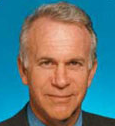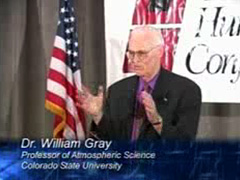James Glassman: The Journalist Turned Journo-lobbyist's Bid to Be PR Czar
 James Glassman, the nominee for Under Secretary of State for Public Diplomacy, probably won't have much of an impact on how the United States presents itself to the rest of the world.
James Glassman, the nominee for Under Secretary of State for Public Diplomacy, probably won't have much of an impact on how the United States presents itself to the rest of the world.
For one thing, he'll only have 11 months in the post. For another -- as his predecessor Karen Hughes proved -- putting shinier lipstick on the pig of U.S. foreign policy doesn't do much to assuage widespread anti-American sentiment. Still, the Senate Foreign Relations Committee's January 30 hearing on Glassman's nomination provided some insight into Washington's evolving view of public diplomacy.
In his prepared opening statement (PDF), Glassman echoed some popular State Department talking points:
The war against Al Qaeda and other extremist threats to peace, freedom, and justice is not only military. It is a war of ideas. ...
Exchanges are the crown jewels of public diplomacy. ... The truth is that ordinary Americans are superb citizen ambassadors. ... The problem is that the vast majority of people in the world have never met an American. ...
Never, in my view, should global public opinion polls determine the foreign policy of the United States. Can we do a better job of explaining our policies? Yes. Will those policies be universally embraced? No.
Perhaps the most interesting aspect of Glassman's testimony was his emphasis on the Internet:
How do we get the rest of the world to know about these [exchange] programs ... let's say, electronically come into contact with more Americans? ... One of the things that I want to try to do, especially in concert with [Assistant Secretary of State for Educational and Cultural Affairs nominee] Goli [Ameri], because both of us have a background in telecommunications and Internet, is to amplify what we're doing. ...
I got an impressive demonstration of this the other day, the Digital Outreach Team, which is now I believe eight or nine people who are blogging, identifying themselves as U.S. government representatives. But they're on blogs, they're on websites, Arabic language, Farsi, Persian and Urdu, and ... trying to get the facts out. ...
A lot of the new [public diplomacy] tools have to be through high technology. ... Our enemies are ... eating our lunch, when it comes to getting their word out on the Internet. But we are coming back. And we are coming back forcefully. The Digital Outreach Team that I talked about earlier. We are, as far as we can tell, the only government that's actually participating in blogging, in going online and saying 'Here's the truth about it.' We're pushing back. We need to do that more and more. ... We're using more and more of the tools that exist on the Internet to get our word across. And that will be a major focus of my attention, if I'm confirmed.
Glassman's remarks bring to mind his integral role in Tech Central Station (TCS), a corporate-sponsored news and opinion website set up by the Republican lobbying firm DCI Group. TCS has helped ExxonMobil pooh-pooh global warming, McDonald's slam the movie "Super Size Me," and the pharmaceutical industry oppose imported drugs -- all while giving the appearance of independent support for its sponsors's agenda.
 "James Glassman and TCS have given birth to something quite new in Washington: journo-lobbying," wrote Washington Monthly's Nicholas Confessore in 2003. TCS helps its sponsors, many of whom are also DCI Group clients, "dominate the entire intellectual environment in which officials make policy decisions," according to Confessore. Glassman's willingness to associate his name and journalistic past -- which includes serving as the editor of Roll Call and writing a financial column for the Washington Post -- with a journo-lobbying venture was key to TCS's success.
"James Glassman and TCS have given birth to something quite new in Washington: journo-lobbying," wrote Washington Monthly's Nicholas Confessore in 2003. TCS helps its sponsors, many of whom are also DCI Group clients, "dominate the entire intellectual environment in which officials make policy decisions," according to Confessore. Glassman's willingness to associate his name and journalistic past -- which includes serving as the editor of Roll Call and writing a financial column for the Washington Post -- with a journo-lobbying venture was key to TCS's success.
It's too bad that no Senators questioned Glassman about Tech Central Station, or his involvement with Investors Action, an organization with DCI lobbyists among its personnel. Investors Action has listed among its goals "tort reform" and ending the "death tax," but in 2006 nearly all of its expenses went towards hosting a forum on "the repercussions for the region when Latin American countries struggle to meet their debt commitments," according to its financial report for the year.
Asking Glassman about his role in these apparent front groups is especially important, since he seemed to suggest during his testimony that, if confirmed as the U.S. government's PR czar, he would use DCI-style tactics. Compare this passage from an earlier, more frank version of the DCI Group's website:
Whatever the issue, whatever the target -- elected officials, regulators or public opinion -- you need reliable third party allies to advocate your cause. We can help you recruit credible coalition partners and engage them for maximum impact. It's what we do best.
with Glassman's response to a question about how to challenge Al Qaeda's ideology:
The ideology of Al Qaeda is based on a distorted view of a religion, and it's very difficult for us, as Americans or as non-Muslims, to say to them or to their followers, 'You know, this is what the Koran really says. It's not what you say it says.' We're not particularly credible in that sphere. It's important to have credible voices, Muslim voices, and I believe that that is an area we need to do better in, in encouraging Muslim voices to step forward.
Another important issue not addressed during the Senate Foreign Relations Committee hearing is Glassman's understanding of the Middle East. Glassman currently chairs the Broadcasting Board of Governors (BBG), which oversees all non-military U.S. government-funded international broadcasting, but it's a position he's held for less than a year. As he repeatedly mentioned during his testimony, Glassman also served on the 2003 "Advisory Group on Public Diplomacy in the Arab and Muslim World." But that was a three month volunteer position, the impact of which is called into question by such uninformed statements as this anti-peace activist screed, penned by Glassman in April 2003:
The military might and presidential resolve of the United States are already stopping the war in Iraq. Stopping it by destroying its regime. This is not what Sean Penn, Michael Moore, Susan Sarandon, Howard Dean, Jacques Chirac, Jude Wanniski, Pat Buchanan, Wallace Shawn, Robert Novak and their pals had in mind, but it is the best way to end a war -- by defeating an enemy that threatened the peace of the world, a regime that oppressed, tortured and killed its own people. ... It has been a war unmatched in history, with relatively few civilian and allied casualties and the prime objectives -- control of the capital and the destruction of Saddam's regime -- achieved in only a few weeks.
"I am America," which is being shown in U.S. embassies and consulates worldwide
Glassman's remarks to the New York Times in December 2003, after he toured several Middle East and Arab countries, also suggest a certain cluelessness: "I was really shocked by the level of animosity over our policies toward Israel and the Palestinians, even in places like Turkey."
Judging by their questions, the Senators considering Glassman's nomination are more interested in Latin America than in the Middle East. Committee members flagged Cuba, Venezuela, Bolivia and Ecuador as particular areas of concern. Glassman agreed, elaborating on the BBG's attempts to evade Cuba's signal jamming and referring to Venezuela as an "extremely difficult environment" for U.S. propaganda.
Surprisingly, given his public relations and private sector background, Glassman did not mention the government-industry partnerships that Karen Hughes increasingly trumpeted towards the end of her tenure at State. Perhaps stirringly patriotic movies -- such as "Welcome: Portraits of America," donated to the State Department by Walt Disney, and "I am America," donated by Business for Diplomatic Action -- just aren't his style.
But Glassman fully endorsed the "rapid response" media offices established by Hughes:
[Karen Hughes] establish[ed] media hubs in London, Brussels and Dubai. And, in fact, when I was in Dubai two months ago, I met with the people there. It's a very small staff. There are really only six people throughout the world who are doing this. But what they're doing is they're getting out into the Arabic language media, as well as other media, on a very fast, very quick response basis and, again, engaging.
If the Foreign Relations Committee and full Senate confirm Glassman, he's likely to follow in Hughes's footsteps, with a greater emphasis on Internet tools and a new cadre of "credible" pro-U.S. Muslim influencers. But unless the United States makes real changes in its foreign policy, the U.S. global "brand" will remain tarnished.
If Glassman is tempted to try to sway world opinion with his bag of PR tricks, he would do well to remember his own words of caution:
We have to be honest. We live in a world in which people are very sophisticated. They have numerous sources of information. If we tell them lies, they're going to figure that out pretty quickly.
Indeed. Some might say that's what fueled the U.S. image problem in the first place.
Diane Farsetta is the Center for Media and Democracy's senior researcher.
Many of the links in the above article are to articles on SourceWatch, the Center for Media and Democracy's collaborative online encyclopedia. SourceWatch volunteer editors can help update, expand and improve these or any of the other SourceWatch profiles of people, issues and groups shaping the public agenda. It's free to sign up, and we'd love to have you join us.





Comments
Diplomacy in Bush's budget request
From the [http://www.washingtonpost.com/wp-dyn/content/article/2008/02/03/AR2008020303081.html Associated Press] today:
'We have to be honest..'
Okay, so rename the film I Am America and Neither Can You.